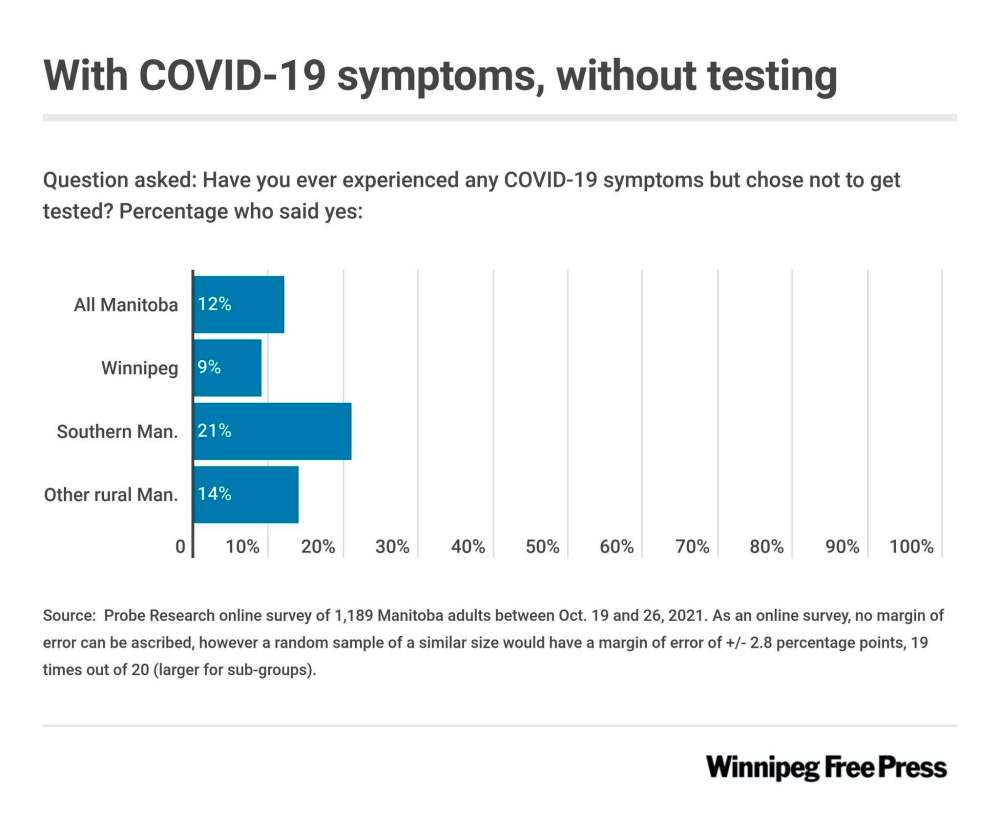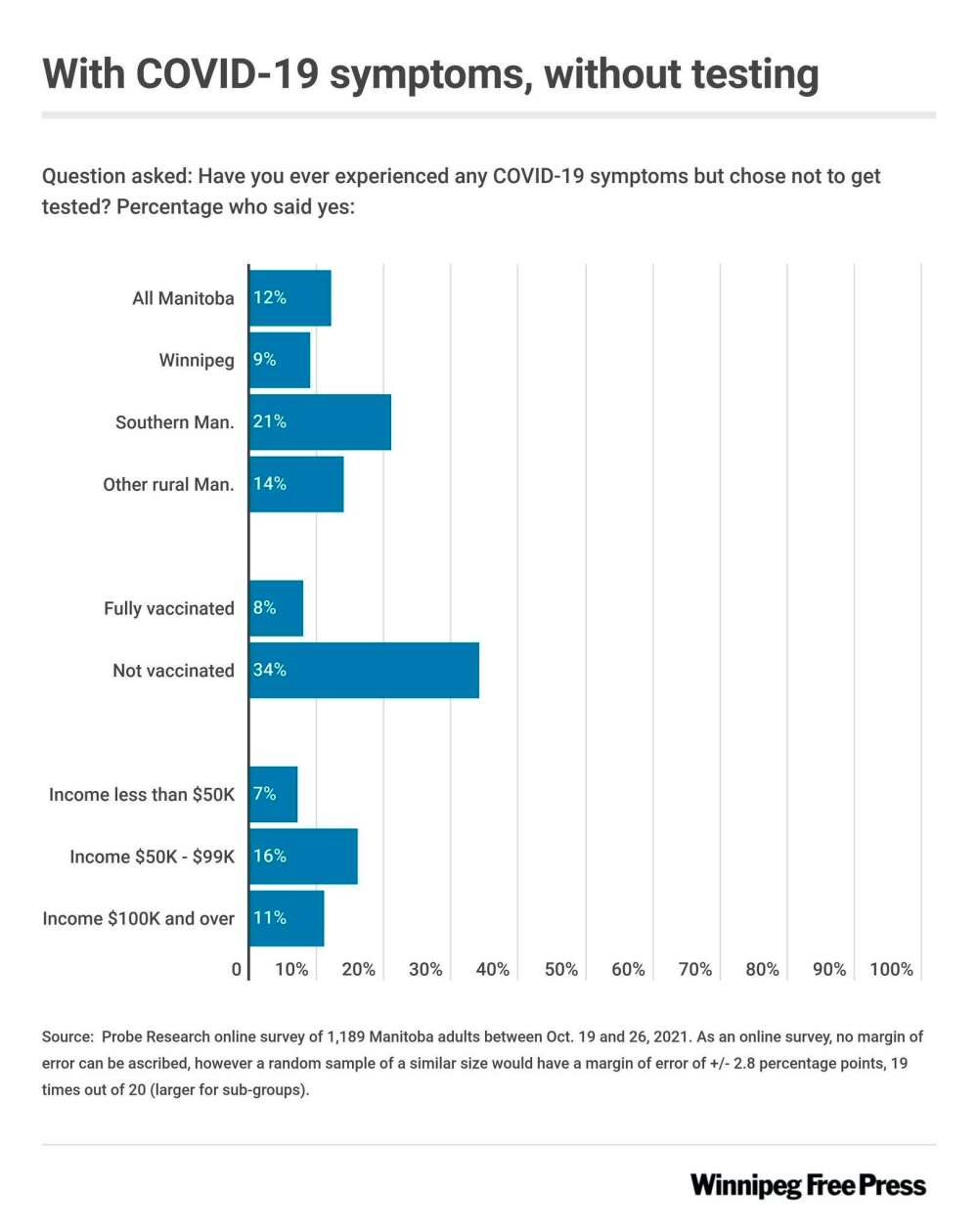Manitoba’s great COVID-19 divide
Poll underscores entrenched skepticism in southern region
Advertisement
Read this article for free:
or
Already have an account? Log in here »
To continue reading, please subscribe:
Monthly Digital Subscription
$1 per week for 24 weeks*
- Enjoy unlimited reading on winnipegfreepress.com
- Read the E-Edition, our digital replica newspaper
- Access News Break, our award-winning app
- Play interactive puzzles
*Billed as $4.00 plus GST every four weeks. After 24 weeks, price increases to the regular rate of $19.95 plus GST every four weeks. Offer available to new and qualified returning subscribers only. Cancel any time.
Monthly Digital Subscription
$4.99/week*
- Enjoy unlimited reading on winnipegfreepress.com
- Read the E-Edition, our digital replica newspaper
- Access News Break, our award-winning app
- Play interactive puzzles
*Billed as $19.95 plus GST every four weeks. Cancel any time.
To continue reading, please subscribe:
Add Free Press access to your Brandon Sun subscription for only an additional
$1 for the first 4 weeks*
*Your next subscription payment will increase by $1.00 and you will be charged $16.99 plus GST for four weeks. After four weeks, your payment will increase to $23.99 plus GST every four weeks.
Read unlimited articles for free today:
or
Already have an account? Log in here »
Hey there, time traveller!
This article was published 29/10/2021 (1570 days ago), so information in it may no longer be current.
From going around town while feeling sick, to being uneasy about vaccination mandates, southern Manitobans have a different belief system than people in other regions of the province when it comes to COVID-19.
New Probe Research data shows the area, which has the lowest vaccination rate of any region in the province, has widespread pushback to following public health rules and the firing of unvaccinated front-line workers.
“It’s completely different mindsets, like we’re not even in the same province,” said Brandon University political scientist Kelly Saunders.
Probe polled 1,189 Manitobans last week and tracked whether responses from areas such as Winkler differed from the rest of the province.
“Some of those communities feel they’re under a microscope because of the coverage and how people are looking at it,” said Curtis Brown, a principal with Probe Research.
“But at the same time, it’s important to quantify that… and see what that difference is.”
A total of 21 per cent of southern respondents who had COVID-19 symptoms admitted to not getting tested. Just 12 per cent of Manitobans overall said they hadn’t been tested while symptomatic, compared with nine per cent of Winnipeggers who fell ill.
Brown said that fits with skepticism about COVID-19 in the southern region, but he noted that racialized people were even more likely not to get tested when they have symptoms, at 26 per cent.
“It’s not totally being selfish, or choosing not to do that; there might be practical reasons,” Brown said. “These might people who are working, and maybe have a sniffle but can’t afford to miss a shift.”
Regardless of region, 34 per cent of Manitobans who remain unvaccinated, and at one point fell ill, say they never got tested. Southern respondents were slightly more likely to say they never changed their habits when they had COVID-19 symptoms.
Manitoba’s south is also a lot more wary of firing front-line workers who refuse to either get vaccinated or do routine rapid testing. Seventy-eight per cent of Manitobans agree people who object to both measures shouldn’t be paid, while only 59 per cent of those in the southern health region have that opinion.

Forty-two per cent of southern respondents said Manitoba’s current restrictions are too excessive, a number that drops to 35 per cent provincewide and just 18 per cent in Winnipeg.
Across Manitoba, 23 per cent of people feel the province’s handling of COVID-19 is worse than that of Alberta or Saskatchewan, which lifted most restrictions only to face extremely high hospitalization rates this fall. In the rural south, that number rises to 35 per cent.
“There is still a sizable number of people who think our province didn’t necessarily do anything better than Alberta and Saskatchewan when it came to managing this,” Brown said.
He said that could be due to Manitoba having to transfer ICU patients to other jurisdictions months before any other province did, while others might believe it would still be better to lift all restrictions.
However, 48 per cent of southern residents said “the whole COVID-19 issue is overblown,” compared with 28 per cent of Manitobans.
That’s risen from a year ago, when 18 per cent of Manitobans said the pandemic was overblown, compared with 36 per cent of respondents in March 2020 as the coronavirus reached Canada.
“A lot of this tracks with the severity of (cases),” Brown said, noting cases are relatively low. “Last year, in the midst of the second wave is when things got scary for people.”
Saunders was surprised to see much a higher amount of pushback from one region of the province, suggesting it’s not a small minority scattered across all regions who are at odds with provincial rules.

“It’s not just a matter of one-off individuals; you have entire communities that cling to these beliefs, in the face of all the facts and reality and evidence and data,” she said.
“There seems to be some larger, almost sociological divides.”
The polling shows 26 per cent of southern respondents don’t feel comfortable sharing their vaccine status, double the rate of Winnipeggers, and particularly high among people aged 18 to 24.
Brown suspected that includes both people who aren’t vaccinated, and immunized people who don’t want to rile up their unvaccinated neighbours.
Southern Health has one of the lowest vaccine uptake in Canada. The province has refused to divulge the test positivity rate for the region, but recently excluded some areas with high vaccine uptake — such as Niverville and Headingley — from restrictions that apply to the rest of the region.
In Probe’s polling, southern residents pushed back on the idea of regional restrictions which limit store capacity in places with higher COVID-19 case counts.
Just 16 per cent of Manitobans oppose the concept, a number that drops to nine per cent among Winnipeggers but soars to 37 per cent in the south.
Saunders was surprised to see such stark differences in communities just an hour’s drive away from each other.

She said the new polling suggests policymakers may need to change course from just providing data and getting trusted community members to convince their neighbours to get a shot.
“If you can’t simply evidence your way out of this problem, then… you’re left with coercion and enforcement. Which is only going to get people’s backs up against the wall even more, and make them resist even further,” Saunders said.
“It certainly presents a larger challenge.”
dylan.robertson@freepress.mb.ca
History
Updated on Friday, October 29, 2021 8:25 PM CDT: Adds art
Updated on Saturday, October 30, 2021 10:53 AM CDT: Corrects typo in second graf.

